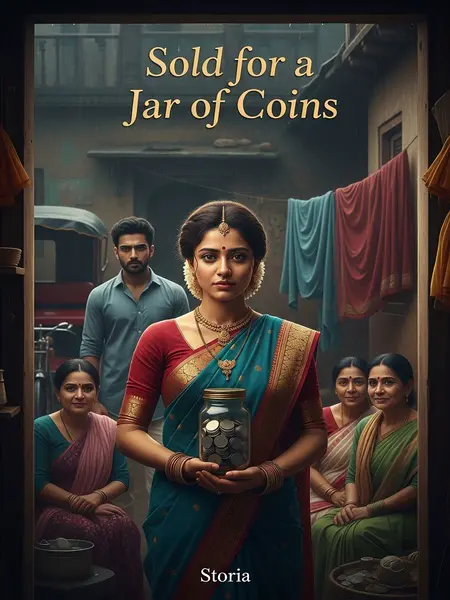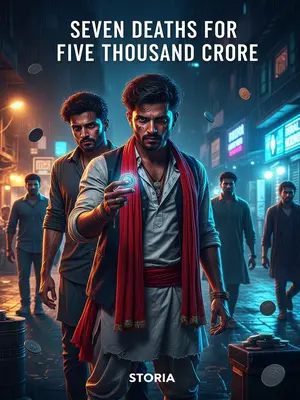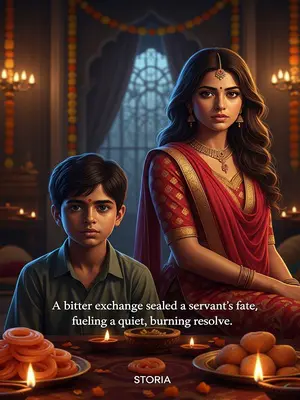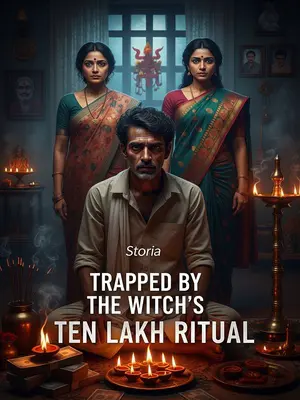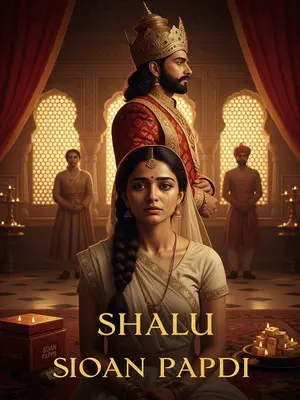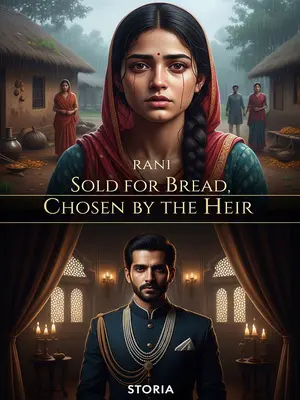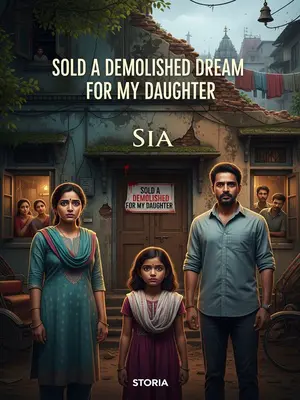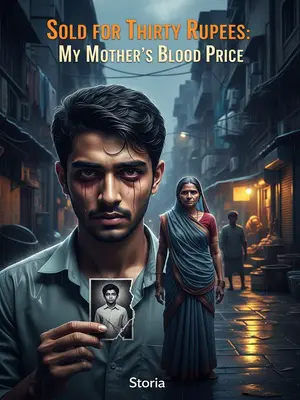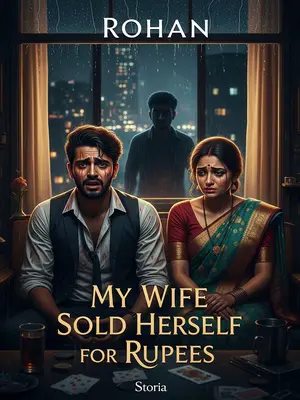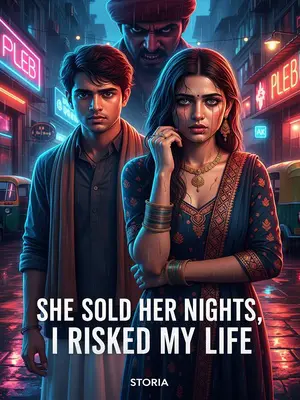Chapter 2: The Cost of Pride
Chintu blocked the path of the wedding car, unable to stop himself from pleading for his young master, Rohan Sharma:
Chintu, clutching the frayed end of his kurta, darted in front of the car, his eyes wide and earnest. The driver, a distant cousin of the Sahus, honked twice in irritation, but Chintu paid no heed.
"A few days ago, bhaiya ordered several rolls of red silk from Lala’s shop in the bazaar, and even sent someone to Mumbai to pay a high price for a batch of Shaadi ka sharbat. Isn’t that clearly for marrying you, didi?" he said, his voice dropping as he glanced at the neighbours, nervous to speak ill of the Sahu family out loud.
The words tumbled out of him, his voice trembling. In his eyes, every little thing had been for me, though I only ever saw Rohan’s cold stare. Chintu looked at me, as if hoping his loyalty might change my mind.
Seeing I didn’t reply, Chintu rose on tiptoe and pointed at the jar in my arms:
He was almost pleading now, gesturing at the jar as though it was a living proof of a promise made. A nearby cow, decorated with a painted horn for someone’s pooja, watched us without blinking. Chintu’s words seemed to hang in the air, heavy with monsoon humidity.
"Didn’t bhaiya say, when you fill the jar, he’ll marry you and bring you home? Now that the tough days are over and the jar is finally full, why are you leaving, didi?"
I thought for a moment and wondered if perhaps I was being a little stubborn.
My mind flashed back to that first arrival: trembling legs, patched dress, the overwhelming smell of frying onions and incense—a world away from Mausi’s sparse kitchen. Had I really come so far only to walk away now? Or was I just too tired to fight another day?
A year ago, when I arrived at the Sharma family’s bungalow in Rajpur, it was lunchtime. I was thin and small, wearing patched clothes. Afraid of being looked down upon, I glanced at the food on the table and lowered my head, swallowing my saliva quietly.
The clatter of stainless steel plates, the hiss of tadka, and the heat from the tandoor—everything felt alien. I kept my eyes fixed on the corner of the table, barely daring to breathe in the aroma of hot phulkas and aloo sabzi.
Rohan Sharma looked at me with utter disdain and reflexively told Chintu to throw me out as if I were a beggar.
He waved his hand like a zamindar dismissing a laborer, his tone clipped. I shrank back, clutching the pallu of my dupatta. Chintu hovered uncertainly, caught between duty and pity.
Uncle Sharma put down his roti and scolded him, saying that when the Sharma family fled the drought years ago, if not for a stranger giving Dadaji a handful of rice, there would be no Rohan Sharma today to look down on me.
The old man’s voice thundered, making the brass tumblers on the table vibrate. He reminded Rohan of the family’s own days of hunger, when charity had saved them from ruin. Even Aunty’s eyes softened, and for a moment, I felt less alone.
Uncle Sharma told me gravely that since it was an old family debt, the Sharmas would not be ungrateful.
His words, spoken in the measured tones of someone who knows the weight of gratitude, stuck with me. The silence that followed was only broken by the sound of someone’s mobile phone playing an old Kishore Kumar tune in the kitchen.
But seeing Rohan’s look of disgust and his crisp kurta, I hesitated.
He stood with one hand in his pocket, the other toying with the cuff of his kurta, his lips pressed into a thin line. I looked at my scuffed chappals and wondered if I really belonged here.
…Otherwise, maybe forget this marriage; turning Rohan Sharma into a few kilos of hot samosas would be fine too.
Somewhere deep inside, a rebellious thought flickered. If only I could trade him for a plate of steaming samosas and sweet chai, life would be simpler. I suppressed a smile, biting my lower lip.
But before I could say anything, Rohan turned away in disgust, suddenly noticing the empty Horlicks jar on the table, and sneered:
He glanced at the jar with mock interest, as if it was a joke only he understood. The sound of his scoff seemed to echo in the tiled hall.
"Shaadi toh tabhi hogi jab tu yeh jar bhar ke dikhaye. Aur Sharma parivar se koi badi baat expect mat kar."
His words landed like cold water, the sharp edges cutting through any hope I might have nursed. Even the ceiling fan seemed to whir a little louder, amplifying the silence.
His eyes were full of mockery, as if I were a parasite coming to the Sharma family for a free meal under the guise of marriage.
I felt the burn of shame in my cheeks, but somewhere under that, a stubbornness took root. If he thought I was there for an easy life, he was sorely mistaken.
Well, he really underestimated me.
I’m not a lazy girl who eats and drinks for free.
The words repeated in my head, echoing the voices of my Mausi and my mother before her. In our house, even the crows had to earn their keep.
I can wash clothes and cook, weave mats and stitch chappals, embroider and draw rangoli—all of it.
I remembered all the things Mausi had taught me, her hands guiding mine through the patterns of a new rangoli each festival, her stories woven into every stitch. My skills were my strength.
I’m skillful and hardworking; I can make a good life.
There was a quiet pride in the knowledge that I could stand on my own two feet. I straightened my back and fixed my gaze on the jar, as if daring it to fill itself.
Hugging that little Horlicks jar, I looked earnestly at Rohan Sharma:
My hands trembled, but my voice was steady. I looked him in the eye, feeling the weight of years of hunger and longing pressing down on my shoulders, but lifting, just a little, as I spoke.
"It’s a deal."
A hush fell in the room, broken only by the distant call of a vegetable seller. I watched as Rohan’s expression flickered, just for a second, from scorn to surprise. The battle lines were drawn.
I thought the jar was small and would be easy to fill.
At first, I stayed up for half a month, drawing embroidery patterns and making rakhis for others. The money quickly covered the bottom of the jar.
Every night, I stitched under the glow of a single bulb, my eyes aching, fingers stained with ink and colour. The first few rupees sounded like music as they landed in the jar. For a moment, it felt like victory.
But most of it was taken by Chintu.
One morning, I found the jar lighter. Chintu, avoiding my eyes, swept the floor with unusual vigour. I counted the coins again and again, my heart sinking.
Hugging the jar that clinked with just three coins, I went to ask Chintu, but those coins were by Rohan’s bedside.
I caught sight of them lying on a cracked table beside his bed, next to a half-finished book and a broken cricket bat. The injustice of it burned in my chest.
Rohan Sharma was in the garden gazebo, listening to old Hindi songs and admiring the gulmohar tree with a group of useless friends.
The air was thick with the scent of blossoms, and the chatter of his friends mixed with the distant jingle of an ice-cream vendor’s bell. Rohan, lounging as if the world owed him comfort, barely acknowledged my presence.
Chintu knew I often stayed up late working and dared not look at the dark circles under my eyes:
He mumbled excuses, his head down, as if my exhaustion was contagious. The shame on his face made it hard to be angry, but I couldn’t let it go.
"Bhaiya said, didi eats and lives at the Sharma family, and besides food and stay, there’s also the cost of kerosene, notebooks, and ink…"
The list sounded endless, a running tally of my existence. Even the air I breathed seemed to come with a price tag. I bit back a retort and turned to face Rohan.
In the April sun, Rohan leaned against the railing, carelessly picking up a chai cup and looking at me:
The sunlight danced on his neatly combed hair, his kurta crisp, his face a mask of indifference. He sipped his tea with the confidence of someone who’d never known hunger.
"Does Miss think she can eat and drink for free before even marrying in?"
His words, laced with sarcasm, drew laughter from his friends. My hands balled into fists, but I refused to give him the satisfaction of seeing me cry.
Suddenly thinking of something, Rohan laughed mischievously,
He leaned closer, his tone turning mock-friendly. "Or are you just so eager to marry me you can’t wait?"
Hearing his teasing, those good-for-nothing friends openly stared and laughed at me:
Their words tumbled out in a mix of Hindi and English, each trying to outdo the other with silly jokes. One even whistled under his breath, drawing more giggles.
"Rohan is so smart—if I were a heroine, I’d run away with him."
"A young woman’s feelings are endless; now the nights are warm and days are long, perfect for romance."
These words put Rohan in a good mood. He pointed at the pile of coins I’d earned with hard work:
He tossed the coins to his friends, as if they were nothing more than tokens from a fairground game. My heart twisted, watching my savings become their lassi money.
"Well said. Take this money and enjoy some cold lassi."
When he gave away my hard-earned money, Rohan looked at me leisurely, wanting to see anger and embarrassment on my face, hoping to make me cry.
But he was wrong.
I met his gaze, refusing to blink first. If he expected tears, he would have to wait a long time.
When I get stubborn, I neither cry nor create a scene. Poor people want to keep their dignity too:
I stood straighter, recalling Mausi’s words: "Hum garib hain, par apni izzat sambhalna bhi aata hai." My dignity, though battered, was not for sale.
"Then every pinch of rice and every page of notebook, rent and food at the Sharma family, please trouble Bhaiya to write a detailed list for me. I believe Bhaiya is a real man and won’t bully his own fiancée."
My voice was steady, almost cold, and I could see a flicker of surprise in his eyes. Chintu’s mouth fell open in admiration.
After that, saving money became very difficult.
Every paisa felt like a mountain to climb. The world, already tilted against me, seemed to tilt further. Still, I woke before dawn, worked until my bones ached, and watched the coins pile up, slow as the summer’s first rain.
Breaking ice to wash clothes in winter, weaving mats and making chappals in summer. Ice shards and bamboo splinters left old and new wounds on my hands. When I was stubborn, the pain was bearable.
The cuts stung, but I wore them like medals. Each wound was proof: I could survive this.
But eating at the Sharma family, there were always sweets and cakes, so fancy I’d never seen their like. But they cost a lot. I couldn’t afford them.
The dining table would groan with boxes of kaju katli and pink-hued cham-cham, things I’d only seen through a halwai’s window. Their price, whispered by Chintu, was more than a week’s work for me.
Rohan always tasted a bite and then threw them away in front of me. When he saw me craving, he would mock me bluntly:
Rohan tossed the kaju katli into the dustbin, and the silver foil stuck to his fingers. He wiped it on the tablecloth without a glance. "Neha, I’ve seen many girls like you. Clearly lazy and greedy, shallow, only wanting to marry into money for a good life but pretending not to care."
These words made me feel ashamed and my face burn.
My cheeks prickled, a mix of anger and humiliation. Still, I looked away, blinking back tears, determined not to let him see my pain.
When I lived with Mausi, I was used to being hungry, always working a lot but never having enough to eat.
I remembered the long afternoons spent in Mausi’s courtyard, my stomach rumbling as I waited for her to finish serving the rest of the family before slipping me a handful of rice. Mausi would mutter to the neighbour, "Bas, yeh ladki toh aalsi hai, dekho kaise baithi hai neem ke neeche."
One autumn, after cutting grass all day, I came home to find no one had left me a bite of dal or rice. So I stole half a cold roti from my younger cousin and was subjected to Mausi’s taunts and indirect scolding for three days.
The memory of Mausi’s voice, sharp as a belan striking a plate, still rang in my ears: "Arey, look at her! Not even a crow on the neem is as greedy."
She said the crows on the neem tree were lazy and greedy, shallow, and only knew how to make noise all day.
Even the crows, black and glossy in the morning sun, seemed to caw just for me, echoing her insults.
I didn’t know how to answer her.
Because I really did want to stay at the Sharma family.
I swallowed the urge to run, to cry, to shout back. A warm bed, a full plate—was it so wrong to want these?
Maybe, maybe I really am lazy and greedy.
The thought crept in, unwelcome, but hard to ignore. Was it wrong to want comfort, to want a little more?
Winter is too cold; I want a bite of hot jalebi.
The longing for sweet, sticky jalebi on a foggy winter morning was almost too much to bear.
Summer is too hot; I want to rest and drink a glass of nimbu pani.
On those scorching afternoons, as sweat trickled down my back, I dreamed of cool, tart nimbu pani served in a chipped glass tumbler.
In the end, it’s all because I’m lazy and greedy, foolishly longing for a good life.
I laughed at myself, a hollow sound swallowed by the big empty kitchen. The jar, heavy with coins and hope, was my only companion.
Actually, ten days ago, the Horlicks jar was already full to the brim. My good days were just about to begin.
I’d counted every coin, heart pounding, certain that this was the start of something new. I’d even imagined how my wedding lehenga might look, dreaming in shades of crimson and gold.
But then a thief came into the room.
That night, the ceiling fan clicked above me, slow and tired, as I counted my coins again and again. The night was silent except for the whir of the ceiling fan and the distant barking of street dogs. I woke to find the jar lighter, the coins disturbed.
I knew very well who the thief was.
In the Sharma house, secrets didn’t last long. The guilt in Rohan’s eyes the next morning was a dead giveaway.
Because only the very top of the jar’s money was stolen, most was left for me.
He could have taken it all, but he didn’t. The act was childish, almost petulant—a silent battle of wills.
"Why not steal it all?"
The question haunted me. I paced the verandah, listening to the soft hum of insects, the world shrinking to just me and the jar.
At that time, Rohan lay on a plastic chair in the courtyard, a book covering his face as he pretended to nap guiltily, not daring to look at my reddened eyes:
He feigned sleep, the pages of his book trembling with every breath. I saw his fingers twitch, as if he wanted to reach out but didn’t know how.
"That thief is as shallow as you, isn’t that enough?"
His words, muffled by the book, reached me all the same. I wiped my eyes, unwilling to give him the satisfaction of seeing me cry again.
Thinking I’d left, he peeked carefully from under the book and saw me sitting under the grapevine, hugging the jar and wiping my eyes hard.
The vines above me rustled in the wind, casting dappled shadows across my lap. I held the jar close, as if it could shield me from everything.
Feeling guilty, Rohan brought a delicate piece of barfi to me, uncharacteristically softening his tone to coax me:
For the first time, his voice lost its usual edge. He set the barfi on the step beside me, his hand hovering, unsure. He cleared his throat awkwardly and looked away, pretending to check his phone.
"Arrey, this is for you, you don’t need to pay, just stop crying. That money—maybe when the thief thinks it over for a couple of days, he’ll bring it back to you."
He looked away as he spoke, his cheeks a little pink. I almost laughed, but swallowed the sound, cradling the jar tighter.
I ignored him, picked up the Horlicks jar, and left without a word.
The barfi remained on the step, melting in the evening sun, as I retreated to my corner, dignity and resolve stitched together, holding on.
Chintu mentioned this, hoping I’d remember old feelings:
Chintu’s voice trembled as he tried to make me see what he saw: signs of affection hidden in clumsy acts. His faith in Rohan was unshakeable, even when mine had run dry.
"At first, he was going to take it all, but bhaiya hesitated and put most back, only taking a small handful. Actually, I could tell, bhaiya already liked you, but he’s always been stubborn and hasn’t come around yet, unwilling to admit it. So he stole your money, wanting to drag it out a few more days, and when he figured it out, he’d marry you…"
His explanation was childish but sincere, the kind of story you want to believe, even when you know better.
Seeing I didn’t speak, Chintu felt a glimmer of hope:
He looked at me with wide, earnest eyes, like a younger brother pleading for an elder sister to forgive a prank. "Besides, that Sahu family is really poor, can’t even afford food, and the Ambassador is rented with pooled money."
He said the Sahu family was poor.
His voice dropped, as if poverty was a contagious disease that might follow me out the door. I almost smiled—Chintu’s concern was real, even if his reasons were not.
But the Ambassador before me, its garlands were fresh. The soft seat cover inside was new, the stitches messy but dense, clearly done with care. At dusk, the wind blew, and the garlands fluttered, pleading for the Sahu family’s young master.
The scent of marigold and the softness of the seat covers told me all I needed to know. The world judged by wealth, but care and respect—those were priceless.
It’s alright, I just happened to save some money too.
The weight of the jar felt different now—not just a burden, but a promise to myself.
Hugging the small, full Horlicks jar, I sat in the soft Ambassador.
The car rattled over potholes, but I sat straight, head held high. My hands trembled, but my heart was steady.
Chintu was so anxious he was about to cry:
His voice wobbled, and I could see the tears glistening in his eyes. He wiped his nose with his gamcha, sniffling like a lost puppy. "Then, when bhaiya comes back, how can I explain? Please, didi, don’t go. Didi, stay…"
I looked down at the jar, glanced at the marigold garlands outside, thought for a moment, and smiled:
A slow smile spread across my face, the kind that comes when you finally accept the turn of fate. I patted Chintu’s hand.
"Just say Neha is shallow and ran off with someone because she liked their pretty wedding car."
The driver grinned at that, and even Chintu managed a weak chuckle, as if the world had righted itself, if only for a moment.
Behind us, the Sharma gate creaked open. Someone was watching—maybe too late.
